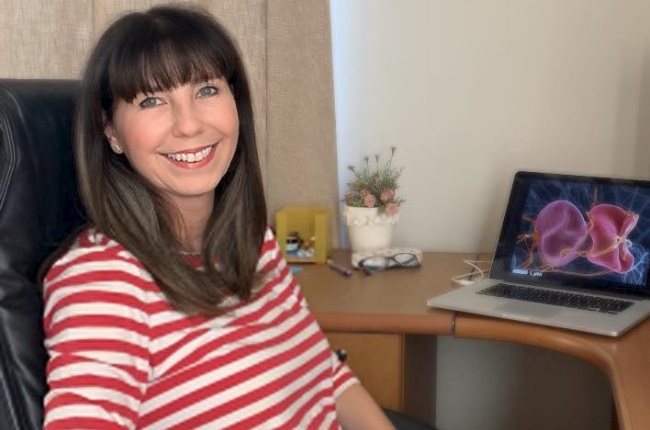
Some would say she’s one of the lucky ones. She didn’t end up in hospital or on a ventilator. She didn’t die. But more than two years after her bout with Covid-19, she’s still battling lingering symptoms.
When she contracted the virus in May 2020, Nita Collins* of Cape Town was sick for a few weeks and experienced “indescribable exhaustion”.
Her symptoms included headache, shortness of breath, joint pain and brain fog, and she also developed pneumonitis, an inflammation of the lung tissue.
Once the worst of it was over, she slowly eased back into her normal routine and believed she was on the mend. But the fatigue and joint pain persisted, and she knew something was seriously wrong.
“I just couldn’t shake the feeling,” Nita (48) tells YOU. “Before Covid, I was doing boxing once a week, Pilates twice a week, and now I can just about make it through a class but end up feeling like I’m going to fall over from exhaustion.
“Some days are better than others,” she says. “Then all of a sudden I’ll have a really bad day where just having a shower takes the life out of me.
“And then I think, ‘Ok, I don’t actually know what’s going on with my body now,’” Nita says, adding that the feeling can sometimes be overwhelming and frightening.
Nita is one of many people battling lingering health problems after being infected by Covid. Mild or moderate Covid-19 lasts about two weeks for most people, but some continue to deal with symptoms such as shortness of breath, joint pain and fatigue for months afterwards – or even years.
It’s also been expensive. Since there’s no one treatment for Covid long-haulers, each time a new symptom rears its head it means a trip to the GP.
“At the moment, for the aches, I’m taking something that’s actually a medication for gout which apparently helps,” Nita says. “But each time I just get a script for something new to treat what I’m dealing with.”
Worldwide, more than 100 million people are reportedly suffering from long Covid or post-Covid syndrome.
It’s been recognised as a chronic condition and medical researchers are hard at work trying to better understand what the virus does to the body and why stubborn health problems persist for some people.
For Lee-Ann Patrick* of Pietermaritzburg, who contracted Covid in April 2021, the problematic long-term symptom is brain fog.
“I didn’t know brain fog was even a thing until my doctor told me it’s a common after-effect of Covid,” Lee-Ann (50) says. “I was confused, forgetful and just had an overall lack of focus at work – things I didn’t struggle with before I had Covid. I began thinking there might be something seriously wrong with me mentally.”
Her inability to think clearly was affecting her so badly she eventually went to see a psychologist.
“Finding the words to express my thoughts and feelings was so difficult at first – I felt helpless and embarrassed,” she says, adding that it took six months of speaking to a professional before she started feeling lighter both mentally and emotionally.
“My recovery has been slow and steady but I’m so much better than I was a year ago,” says Lee-Ann, who also suffers from high blood pressure. “Speaking to a professional and getting support from my husband and also my manager, who knew what I was going through, was super helpful.”
What does the latest research say?
There are three leading theories about what causes long Covid. The first is that the virus survives in the body even after the acute infection passes. Studies have shown that “the virus is capable of persistence in a wide range of body sites”, especially in nerves and other tissues, says American microbiologist Amy Proal, who works at PolyBio Research Foundation, which focuses on studying complex and chronic inflammatory conditions.
The second is that the immune system goes haywire due to Covid-19 infection. Studies have shown that immune cells that were “switched on” to fight Covid were still active eight months after infection.
The third theory is that Covid affects blood flow and circulation – and there has been ground-breaking research from South Africa to support this. Professor Resia Pretorius, head of the department of physiological sciences at Stellenbosch University, has been working on finding the cause of long Covid since 2020.
A recent study in her lab has helped move things one step closer – it found high levels of microclots (minute blood clots only visible under a microscope) in the blood of both acute Covid-19 and long Covid patients. “We also found high levels of various inflammatory molecules trapped in the microclots,” says Pretorius, who has just returned from attending conferences and meetings in the UK, all with the aim of understanding the complexities of long Covid and how to treat it.
Covid-19 isn’t only a lung disease, says Pretorius. It also significantly affects blood flow and blood clotting in the body, and this could hold the key to the many debilitating symptoms Covid long-haulers experience.
In healthy people, clots form (when you cut yourself, for example), and then the body breaks these clots down. But in patients with long Covid the microclots seem to be resistant to this breakdown process. The persistent formation of microclots results in cells not getting enough oxygen to sustain bodily functions – and this can have far-reaching consequences such as causing organ damage and problems with the immune system.
READ MORE| South African children are being struck down by a respiratory virus−here's what parents need to know
Another finding by Pretorius’ research group is that the microclots are insoluble – when she tried to dissolve microclots in her lab using an enzyme, they would not dissolve. Pretorius believes that SARS-CoV-2 sets off a flood of clotting in the body that damages blood vessels and affects circulation.
“We’ve seen vascular inflammation in people suffering from long Covid – there are a lot of researchers seeing that now,” she says. “It’s a very complex disease.”
It’s not only patients who have comorbidities such as high blood pressure or diabetes who develop long Covid. It has also affected people who were perfectly healthy, including well-known athletes, Pretorius says.
One of the biggest concerns is that even mild and sometimes asymptomatic Covid-19 infection may lead to debilitating, long-term disability.
Treatment and testing
Symptoms differ from person to person, so patients need to see their doctor as there is no one treatment for long Covid. “As you experience a symptom, see your doctor so you can be examined and get the correct medication,” Pretorius says. “Until we have clinical trials with good results, that will be a patient’s only option.”
If patients don’t get treatment for the inflammatory symptoms of long Covid, she adds, they are at risk of developing auto-immune diseases such as lupus or rheumatoid arthritis.
Pretorius and her team have patented a long Covid test which checks for microclots, but this method of testing is not readily available at pathology labs. She is now working on developing a new test which she hopes will be available in a couple of months.
EXTRA SOURCES: MED.STANFORD.EDU, SUN.AC.ZA, SPOTLIGHTNSP.CO.ZA




 Publications
Publications
 Partners
Partners



















